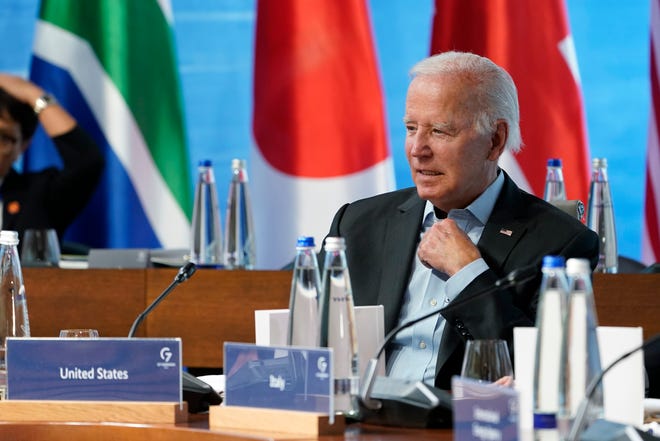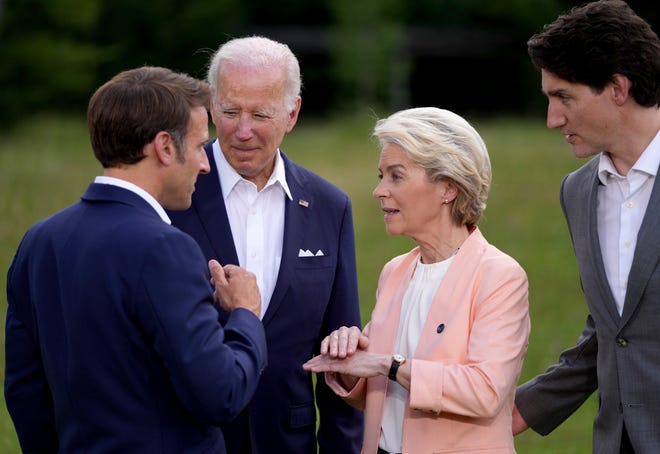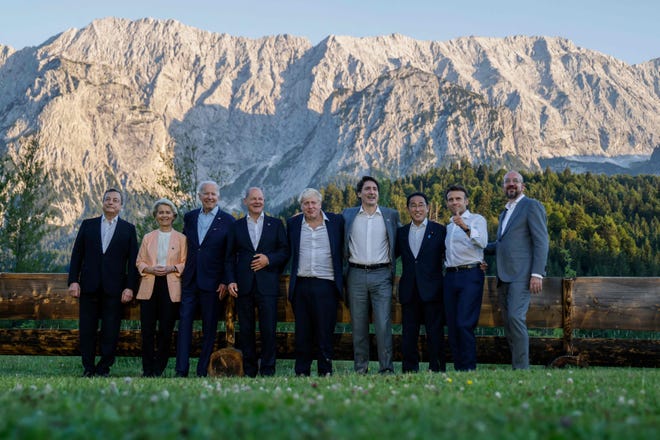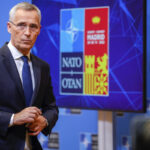ELMAU, Germany — Group of Seven nations are moving closer to capping the price that countries can pay for Russian oil, a senior U.S. official said.
The official said leaders aim to further restrict Vladimir Putin’s cash flow, bring down prices at the gas pump and provide greater stability to energy markets.
Leaders were said to be zeroing in on the way Russian oil is shipped. The U.S. official said G-7 leaders are planning to direct their governments to take urgent steps to design a price cap mechanism for countries that do not participate in the economic alliance.
Jake Sullivan, Biden’s national security adviser, told reporters that an agreement on price caps would mark “pretty dramatic step forward,” adding that it would amount to “one of the more significant outcomes of G-7 summit.”
No additional details on a potential price cap and how it would work were immediately available. Sullivan said the delay of the agreement had to do with the novelty and complexity of the approach.
“It is a new kind of concept to deal with a particularly novel challenge, which is how to effectively deal with a country that’s selling millions of barrels of oil a day and try to deprive it of some of the revenues that they’re getting from the sale of that oil,” Sullivan said.
The latest at the G-7:
- Ukraine comes in focus: Leaders spent their morning discussing ways to help Ukraine beat back a Russian offensive. They were addressed virtually by Ukrainian President Volodymyr Zelenskyy.
- Big decisions: Zelenskyy’s remarks were expected to jumpstart conversations about additional heavy artillery shipments. G-7 leaders are also discussing a price cap on Russian oil.
- Global cooperation: To keep Putin from selling oil to other nations at higher prices, G-7 countries need cooperation from nations outside their alliance.
- Enter India: Germany is hosting G-7 leaders this year at a resort in the Bavarian Alps. Chancellor Olaf Scholz invited India and several other countries to participate.
- Why it matters: India’s imports of Russian oil have spiked recently, as Putin offloads his reserves to nations outside the economic bloc.
- How it affects Americans: A U.S. official declined to project how costs for American consumers would be affected by an oil price cap. The official stressed that the goal is to ensure stability in global energy markets.
- Taxing Russia: The official said new tariffs were carefully calibrated to hurt Russia and are not expected to impact the United States’ supply chain or raise costs for American consumers.

What’s ahead for G-7?
G-7 leaders will spend the second day of a Bavarian summit talking about a leader who was once a part of their exclusive economic club: Vladimir Putin.
In 2014, G-7 nations banished Russia from their gathering over its first invasion of eastern Ukraine. Now, with Putin’s army pummeling the country, world leaders are rushing to stop him.
Leaders will work over lunch (again) — this time discussing climate, energy and health initiatives. Later in the day, they will sit down with guest nations. This host of this year’s summit, Germany’s Scholz, invited the leaders of Argentina, India, Indonesia, Senegal and South Africa to attend.
Italy, France, Germany, the United States, the United Kingdom, Canada and Japan regularly form the G-7, which gets its name from the number of permanent participants. When Russia was part of the organization, it was known as the G-8.

What G-7 leaders are saying
- G-7 leaders reaffirmed their support for Ukraine in a statement that condemned the invasion and called on Russia to remove its military from all areas of Ukraine.
- “It is up to Ukraine to decide on a future peace settlement, free from external pressure or influence,” the joint statement said.
- Leaders pledged to welcome Ukrainian refugees and Russian political dissidents into their countries and hold individuals who commit war crimes accountable.
- They also promised to coordinate on addressing the global food crisis.
- Italian Prime Minister Mario Draghi told G-7 leaders at a Sunday session that capping the price of fossil fuels that are imported from Russia is in their interest. “We need to reduce our funding to Russia. And we need to eliminate one of the main causes of inflation,” Draghi said. “We must avoid the mistakes made after the 2008 crisis: the energy crisis must not produce a return of populism.”

Other G-7 takeaways
The U.S. also announced on Monday that it would impose sanctions that would make it harder for Russia to replace its military equipment. The official said that the U.S. Treasury Department will introduce blocking sanctions on private military companies operating in Ukraine and Russian officials trying to exert authority in contested areas.
G-7 leaders have also agreed on a new way to fund the Ukrainian war effort, according to the White House. A fact sheet on the new measures says nations will seek to use funds generated by new tariffs on Russia to help Ukraine. As part of the announcement, the U.S. says it will raise tariffs on roughly $2.3 billion of Russian goods.
Why it matters
Russia is on the verge of defaulting on its debt for the first time in more than a century, with access to its foreign currency reserves halted. The country is also experiencing inflation above 17%.
But consumers in the U.S. and other G-7 nations are also facing higher costs. Fuel prices in the United States have decreased in the past several days, yet a gallon of gas still costs $0.30 more than it did a month ago.
Biden administration officials have stressed at every turn that Putin’s unprovoked war on Ukraine is primarily causing inflation.
But with no end in sight to the military conflict, Biden is asking his administration and oil and gas companies to come up with creative ways to drive down prices for American consumers.
Want to know more? Here’s what you’ve missed
Biden and G-7 leaders announced a ban on new imports of Russian gold on the first day of their summit. They also launched a global infrastructure initiative.
Gold banned:Biden bans Russian gold imports as G-7 considers new sanctions over Ukraine war: Recap
Ukraine updates:G-7 vows Ukraine support; Kyiv bombarded in ‘symbolic attack’ of Russian missiles; fake mayor fools leaders: Live updates




